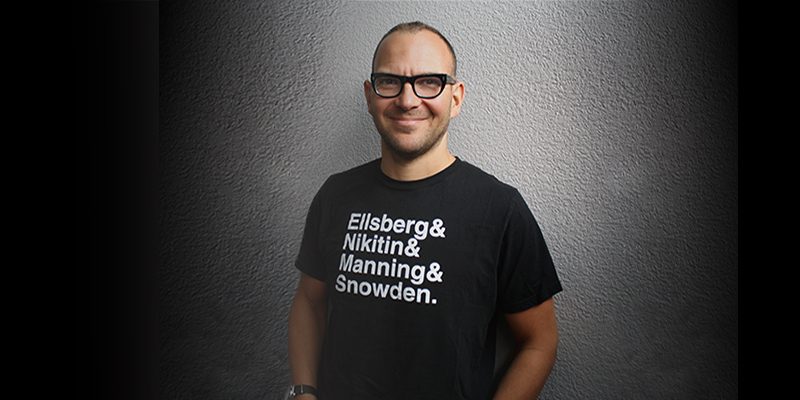Cory Doctorow: A New Deal for Copyright
 Last November, I published a book-length essay about how copyright is failing to serve artists, and how it has come to present a clear and present danger to wider society. The book is called Information Doesn’t Want to Be Free, and it is composed of three snappy arguments (along with forewords by Amanda Palmer and Neil Gaiman) which I will summarize snappily, below:
Last November, I published a book-length essay about how copyright is failing to serve artists, and how it has come to present a clear and present danger to wider society. The book is called Information Doesn’t Want to Be Free, and it is composed of three snappy arguments (along with forewords by Amanda Palmer and Neil Gaiman) which I will summarize snappily, below:
1. Any time someone puts a lock on something that belongs to you and won’t give you the key, that lock isn’t there for your benefit.
The ‘‘digital rights management’’ (DRM) systems that stop you from installing unauthorized iPhone software or ripping a DVD to watch on your tablet are really bad at preventing piracy. For complex technical reasons (explained in the book), they are always destined to fail, catastrophically, as soon as they make contact with the real world.
However, DRM law – nominally aimed at preventing nefarious digital lock-picking – has grossly distorted the market power of publishers (and labels and studios) when it comes to getting leverage on the tech companies that supply them with DRM, companies like Apple, Amazon, Google, and Adobe. That’s because the world’s DRM laws (the US one is the 1998 Digital Millennium Copyright Act) say that it’s a crime to remove DRM, unless you’re the company that added it – when you sell with Apple’s DRM, you lock your customers inside Apple’s walled garden, and only Apple can let them out again (and the one time you can be pretty sure they won’t do that is when you’re having an argument with Apple about how much money each of you should be getting from each customer’s transactions).
If the DRM was really there to prevent piracy of your work, the company wouldn’t object to you taking the DRM off the works when you felt it best. After all, it’s never piracy when the author or publisher permits someone to do something with their copyrighted work.
2. Being famous won’t make you rich, but no one will give you money unless they’ve heard of you.
Beyond Tim O’Reilly’s famous statement that ‘‘the problem for most artists isn’t piracy, it’s obscurity,’’ is another truth: that although there’s no one reliable way to turn fame into wealth, there is no way at all to turn obscurity into even modest sums.
Most things that most artists do will end up losing money, and it was ever thus. If we want to help artists succeed, one important way of doing that is to ensure that when their works do make money, that as much as possible lands in their pockets. And the way we do that is by giving them rules and systems that afford them leverage over their publishers (and labels, studios, etc.). As the number of big publishers has dwindled, down to five today, the terms being offered to authors have declined across the board – for example, today it’s nearly impossible to keep your e-book rights and sell them separately. Indeed, many publishers routinely demand worldwide rights, translation rights, audiobook rights, even graphic novel rights(!).
But some authors don’t have to give up all this. Either they’re indie authors who self-publish – a misnomer, because what they’re really doing is piecing together all the functions of a publisher from services all over the Internet, like PayPal, Google, Amazon, Lulu, etc. – or they’re authors whose self-publishing success has given them the leverage to get a better deal when they go mainstream. For example, Hugh Howey, the author of the indie bestseller Wool, was able to keep his e-book rights when he went into negotiation with Simon & Shuster (likely the only author this decade to have managed the trick) because he’d already shown that they needed him more than he needed them.
Even if we’re not going indie, everyone benefits from a thriving indie sector. It’s a kind of competitor of last resort to the Big Five, and the worst deal they can offer us has to be better than the best deal we think we can get for ourselves by following the indie authors out the publishers’ doors.
But the publishers (and, shamefully, authors’ groups) have declared war on these services. It’s thanks to the entertainment industry that starting a competitor to YouTube today involves not just some hard-drives and a garage, but a $200-300M ‘‘Content ID’’ system that can automatically detect infringing videos. Not that it actually works very well (as the TV and movie and music people are always reminding us), but that barrier to entry, an affordable nuisance to Google, is a show stopper for anyone scrappy and disruptive who’d keep Google on its toes and present an alternative to the deal it offers to rights holders.
The new boss is always the same as the old boss. YouTube recently unveiled a Spotify-like music streaming service, having done a deal with the Big Four labels on how the music for it would be licensed. Afterwards, YouTube quietly told all the indies that they would be forced to accept the terms the majors had negotiated, and the penalty for not accepting these terms would be permanent exile from YouTube, with no access to the service to promote their artists.
The more expensive it is to enter the ‘‘services to indies’’ sector, the less competition we’ll have there, and the more the ‘‘indie’’ channel will just replicate the terrible terms offered by the majors.
3. Information doesn’t want to be free.
I’ve never done anything in my activist career to help information realize its destiny, but we live in an information society, in which people want to be free, and they can’t be free so long as information technology is regulated as a particularly tricky video-on-demand service with a side of piracy.
When we raise the liability bar for services like YouTube, Face-book, PayPal, and WordPress, we mostly impact non-arts activities. By making it possible to remove anything from the Internet by asserting – without proof or penalty for misuse – that it infringes upon copyright, we pave the way for trivial, unaccountable censorship on a mass scale, as we’ve seen when the Church of Scientology, the King of Thailand, and UK neo-Nazis use copyright claims to censor their critics right off the net.
DRM only works if your computer is designed to disobey your orders (‘‘Please save this Netflix stream’’; ‘‘I can’t let you do that, Dave’’), to obey orders from remote parties, and to hide exactly how this is done (lest you drag HAL9000.EXE into the trash). The DMCA makes it a felony to weaken DRM, which includes explaining how it works, or disclosing bugs in the DRM system, because these can be leveraged to ‘‘jailbreak’’ your devices so they take orders from you, not a multinational corporation.
Practically, this means that it’s a felony to tell you about flaws in the supercomputer in your pocket, which is privy to all your conversations, knows who your friends are and where you go, has a camera and a mic that it can see and hear you through, and that you take into the bathroom and the bedroom. Increasingly, these computers – which are becoming woven into the very fabric of our living environments, and even entering our bodies as cochlear implants and pacemakers – are being taken over by creeps, cops, spies, and crooks to compromise their owners in horrific ways that make the most dystopian SF seem like a walk in the park.
So what is to be done?
There are two small policy interventions that would make a huge difference to the balance of commercial power in the arts, while safeguarding human rights and civil liberties.
1. Reform DRM law.
It should never be a crime to:
* Report a vulnerability in a DRM;
* Remove DRM to accomplish a lawful purpose.
With this simple reform, DRM would no longer turn our devices into long-lived reservoirs of pathogens (because bugs could be reported as soon as they were discovered), and would no longer give the whip-hand over publishing to tech companies (because removing DRM to do something legal, like moving a book between two different readers, would be likewise legal).
2. Reform intermediary liability.
* The DMCA ‘‘safe harbor’’ should require submission of evidence that the identified works are indeed infringing;
* If you file a DMCA takedown notice that materially misrepresents the facts as you know them or should have known them, you should be liable to stiff, exemplary statutory damages, with both the intermediary and the creator of the censored work having a cause of action against you, and with the courts having the power to award costs to the victims’ lawyers.
By ensuring a minimum standard of care for censorship demands, and penalties for abuse, the practice of carelessly sending millions of sloppily compiled takedowns would be stopped dead (last year, Fox perjured itself and had copies of my novel Homeland removed from sites that were authorized to host them, because it couldn’t be bothered to distinguish my novel from its TV show). Likewise, penalties for abuse with a loser-pays system of fees would give the victims of malicious censorship attempts grounds for punishing the wrongdoers who make a mockery of out the copyright holder’s toolkit to silence their opponents.
But so long as we’re making a wish-list, here’s the big policy change that would make all this stuff much less fraught: STOP APPLYING COPYRIGHT TO ANYONE EXCEPT THE ENTERTAINMENT INDUSTRY.
Copyright laws were arrived at largely by codifying the practices of the entertainment industry into law, and because they were only triggered by making or handling copies of creative works, these rules only applied to the industry. When every copy of every book involves a printing press, then every copy of every book has been made by someone who’s using industrial machinery and is part of the industry.
Computers work by making copies, so reading a book now involves making copies, as does lending, reselling, or giving away books. That does not make reading into an industrial activity.
Rather than changing the definition of whom copyright applied to, we’ve nonsensically declared that the 12-year-old making a Harry Potter fan site has to understand and follow the same rules that Universal uses to license rights for the Harry Potter theme park from Warner. But it’s obvious – totally, completely obvious – that the 12-year-old will never be able to follow those rules. First, because they are incredibly complicated, and second, because they require her to negotiate a license for all her art and excerpts and suchlike with Warner, and no one at Warner will negotiate with her, period.
If you have to understand the law to read a book, we have failed. If you have to enter into a contract – any contract, even a ‘‘good’’ contract – to read a book, we have failed.
These are cultural, not industrial activities. It’s insane to ask people to sign contracts to read books. Seriously, who actually thinks this is a good idea?
Maybe we do need rules for culture, and maybe we even need laws for culture, but they shouldn’t – and can’t – be the rules we designed for industry.
It’s not always easy to tell the difference between culture and industry, but there are plenty of cases where it’s totally obvious. For those fuzzy cases in the middle, come up with some guidelines and let the courts apply them.
It’s a wildly imperfect system, but at the very least, it isn’t the grossly Kafkaesque idea that you should have to enter into a 22,000-word agreement with Apple, AT&T, and Random House audio in order to listen to a 15,000-word novella.
Cory Doctorow is the author of Walkaway, Little Brother, and Information Doesn’t Want to Be Free (among many others); he is the co-owner of Boing Boing, a special consultant to the Electronic Frontier Foundation, a visiting professor of Computer Science at the Open University and an MIT Media Lab Research Affiliate.
From the January 2015 issue of Locus Magazine






